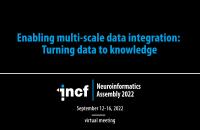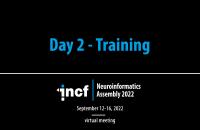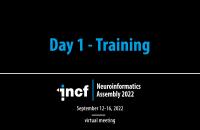Below you will find the latest courses. Please search or select the courses based on the below filters.

Bayesian Models of Learning and Integration of Neuroimaging Data
Krembil Centre for NeuroinformaticsBayesian inference (using prior knowledge to generate more accurate predictions about future events or outcomes) has become increasingly applied to the fields of neuroscience and neuroinformatics. In this course, participants are taught how Bayesian statistics may be used to build cognitive models of processes like learning or perception. This course also offers theoretical and practical instruction on dynamic causal modeling as applied to fMRI and EEG data.

Whole-Brain Modelling
Krembil Centre for NeuroinformaticsGiven the extreme interconnectedness of the human brain, studying any one cerebral area in isolation may lead to spurious results or incomplete, if not problematic, interpretations. This course introduces participants to the various spatial scales of neuroscience and the fundamentals of whole-brain modelling, used to generate a more thorough picture of brain activity.

Neuroimaging Connectomics
Krembil Centre for NeuroinformaticsThis course consists of one lesson and one tutorial, focusing on the neural connectivity measures derived from neuroimaging, specifically from methods like functional magnetic resonance imaging (fMRI) and diffusion-weighted imaging (DWI). Additional tools such as tractography and parcellation are discussed in the context of brain connectivity and mental health. The tutorial leads participants through the computation of brain connectomes from fMRI data.

Simulating Brain Microcircuit Activity and Signals in Mental Health
Krembil Centre for NeuroinformaticsThis course offers lectures on the origin and functional significance of certain electrophysiological signals in the brain, as well as a hands-on tutorial on how to simulate, statistically evaluate, and visualize such signals. Participants will learn the simulation of signals at different spatial scales, including single-cell (neuronal spiking) and global (EEG), and how these may serve as biomarkers in the evaluation of mental health data.

Fundamental Methods for Single-Cell Transcriptome Analysis
Krembil Centre for NeuroinformaticsThis course, consisting of one lecture and two workshops, is presented by the Computational Genomics Lab at the Centre for Addiction and Mental Health and University of Toronto. The lecture deals with single-cell and bulk level transciptomics, while the two hands-on workshops introduce users to transcriptomic data types (e.g., RNAseq) and how to perform analyses in specific use cases (e.g., cellular changes in major depression).

Fundamental Methods for Genomic Analysis
Krembil Centre for NeuroinformaticsThis course includes both lectures and tutorials around the management and analysis of genomic data in clinical research and care. Participants are led through the basics of genome-wide association studies (GWAS), genotypes, and polygenic risk scores, as well as novel concepts and tools for more sophisticated consideration of population stratification in GWAS.

Digital Health for Mental Health
Krembil Centre for NeuroinformaticsAs technological improvements continue to facilitate innovations in the mental health space, researchers and clinicians are faced with novel opportunities and challenges regarding study design, diagnoses, treatments, and follow-up care. This course includes a lecture outlining these new developments, as well as a workshop which introduces users to Synapse, an open-source platform for collaborative data analysis.

Applied Ethics in Machine Learning and Mental Health
Krembil Centre for NeuroinformaticsThis course tackles the issue of maintaining ethical research and healthcare practices in the age of increasingly powerful technological tools like machine learning and artificial intelligence. While there is great potential for innovation and improvement in the clinical space thanks to AI development, lecturers in this course advocate for a greater emphasis on human-centric care, calling for algorithm design which takes the full intersectionality of individuals into account.

Reproducible Science (Including Git, Docker, and Binder)
Krembil Centre for NeuroinformaticsThis course consists of two workshops which focus on the need for reproducibility in science, particularly under the umbrella roadmap of FAIR scienctific principles. The tutorials also provide an introduction to some of the most commonly used open-source scientific tools, including Git, GitHub, Google Colab, Binder, Docker, and the programming languages Python and R.

The Future of Medical Data Sharing in Clinical Neurosciences
EBRAINSThis workshop hosted by HBP, EBRAINS, and the European Academy of Neurology (EAN) aimed to identify and openly discuss all issues and challenges associated with data sharing in Europe: from ethics to data safety and privacy including those specific to data federation such as the development and validation of federated algorithms.

Current Methods in Neurotechnology
NeurotechEUThe lecture series focuses on current trends in modern techniques in neuroscience. Inspiring scientists from the NeurotechEU Alliance will give an overview of the latest advances and developments.

Module 5: Calcium Imaging
Mike X. CohenIn this course, you will learn about working with calcium-imaging data, including image processing to remove background "blur", identifying cells based on threshold spatial contiguity, time-series filtering, and principal component analysis (PCA). The MATLAB code shows data animations, capabilities of the image processing toolbox, and PCA.

Module 4: fMRI
Mike X. CohenThis module covers fMRI data, including creating and interpreting flatmaps, exploring variability and average responses, and visual eccenticity. You will learn about processing BOLD signals, trial-averaging, and t-tests. The MATLAB code introduces data animations, multicolor visualizations, and linear indexing.

Module 3: Computational Models
Mike X. CohenThis module introduces computational neuroscience by simulating neurons according to the AdEx model. You will learn about generative modeling, dynamical systems, and F-I curves. The MATLAB code introduces live scripts and functions.

Module 2: EEG
Mike X. CohenIn this module, you will work with human EEG data recorded during a steady-state visual evoked potential study (SSVEP, aka flicker). You will learn about spectral analysis, alpha activity, and topographical mapping. The MATLAB code introduces functions, sorting, and correlation analysis.

Module 1: Spikes
Mike X. CohenThe goal of this module is to work with action potential data taken from a publicly available database. You will learn about spike counts, orientation tuning, and spatial maps. The MATLAB code introduces data types, for-loops and vectorizations, indexing, and data visualization.

Enabling Multi-Scale Data Integration: Turning Data to Knowledge
NFDI NeuroscienceThis workshop is organized by the German National Research Data Infrastructure Initiative Neuroscience (NFDI-Neuro). The initiative is community driven and comprises around 50 contributing national partners and collaborators. NFDI-Neuro partners with EBRAINS AISB, the coordinating entity of the EU Human Brain Project and the EBRAINS infrastructure. We will introduce common methods that enable digital reproducible neuroscience.

INCF Assembly 2022 - Training Day 2
INCFThis course contains sessions from the second day of INCF's Neuroinformatics Assembly 2022.

INCF Assembly 2022 - Training Day 1
INCFThis course contains sessions from the first day of INCF's Neuroinformatics Assembly 2022.

INCF Assembly 2022 - Day 3 Sessions
INCFSessions from the INCF Neuroinformatics Assembly 2022 Day 3.
